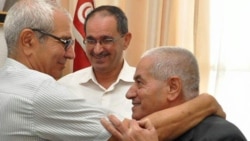A little more than four years ago, the first ripples of unrest in Tunisia signaled an end to the despotic regime of Zine El Abidine Ben Ali and a shift toward democratization of Tunisian society. But what the Tunisian people inherited from the previous regime was a state apparatus crippled by hollowed out institutions, rife with corruption, and security forces meant to protect the status quo to the detriment of the people.
Nonetheless, despite numerous challenges including an increasing rift between political movements, sporadic civil unrest and increasing violence, Tunisia slowly and steadily progressed toward democracy. It dismantled the police state, forced opposing political parties to make compromises, held two open and free elections, and last year, adopted a progressive constitution.
Much of this progress can be credited to Tunisia’s National Dialogue Quartet, a group of four organizations: the Tunisian General Labor Union; the Tunisian Confederation of Industry, Trade and Handicrafts; the Tunisian Human Rights League, and the Tunisian Order of Lawyers.
The group helped stabilize the fracturing country by drafting an agreement of compromises that served as a roadmap to negotiations, and insisting that all parties who wanted to participate in political negotiations must sign the document. Twenty-one parties signed the document, allowing a national dialog to commence.
“The Tunisian model of inclusivity and respecting fundamental freedoms of all its citizens is the best answer to the violence and extremist ideologies that have torn apart other countries in the region,” said Secretary of State John Kerry in a written statement.
For its “decisive contribution to the building of a pluralistic democracy in Tunisia,” the National Dialogue Quartet won the 2015 Nobel Peace Prize.
The United States congratulates Tunisia’s National Dialogue Quartet on this well-deserved award.
“This extraordinary honor recognizes the critical role civil society organizations played following the Tunisian revolution -- by preserving national unity and constructing a political process that led to both a constitution and free and fair national elections,” said Secretary of State Kerry.
“Their inspiring achievement is a shining example for all societies that are working towards an inclusive transition from dictatorship to democracy.”
















